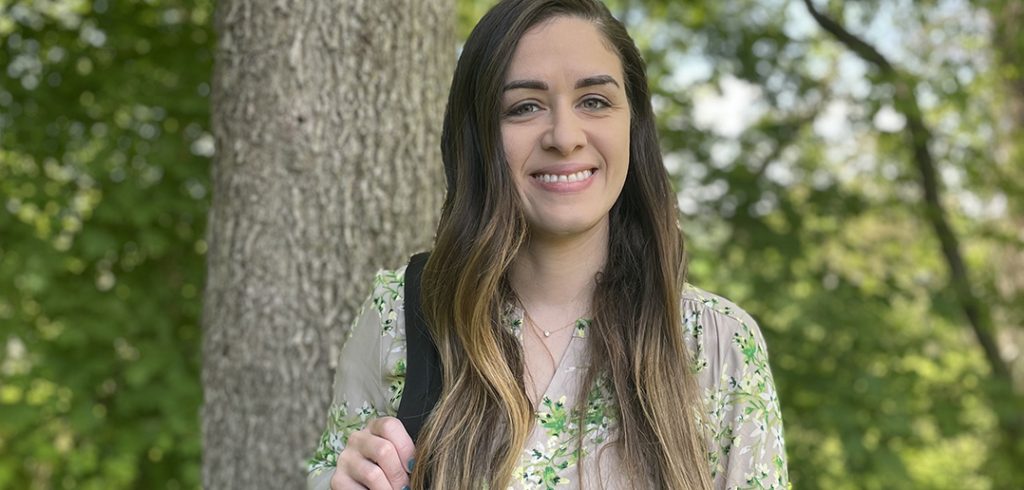Jasmine Gurreri grew up near the Rose Hill campus and went to Roosevelt High School just across the street on Fordham Road. She graduated from Marymount the year the college became part of the University, so her bachelor’s diploma bears the Fordham name. Yet in all that time, she’d never set foot on campus. This May, Gurreri will head to Rose Hill for her second Fordham degree; she’ll be graduating with a Master’s in Real Estate from the School of Professional and Continuing Studies.
“I didn’t think I was even going to go to college, because I thought I couldn’t afford it,” said Gurreri. “And I never thought I could graduate from a place like Fordham University.”
Gurreri noted that she didn’t come from an affluent background. Like so many of her high school friends, she said, limited exposure to higher education limited her aspirations. Her mother came from a rural part of Puerto Rico and her father was from a rural part of the Dominican Republic. Neither had the opportunity to go to college. When her older brother and sister graduated from high school, they went straight to work.
Gurreri credits a series of mentors with exposing her to options. The first was Martha Graham, an executive at Chase Manhattan Bank who mentored teens at Roosevelt High School.
“I told her, ‘I don’t think I can go’ and she said, ‘Absolutely not, of course, you can,” recalled Gurreri.
‘Zero In and Focus’
With Graham’s encouragement, Gurreri got accepted to Marymount, where she experienced a bit of culture shock. Compared to the Bronx, she said, the Tarrytown campus might as well have been California. There, a nun named Sister Fahey issued a stern charge to “zero in and focus,” a habit Gurreri kept to this day. She worked a part-time job in retail that became full-time after graduating. But in quick order, she got her real estate license; married the love of her life, Jimmy Gurreri; moved to Yonkers; and had the first of her three daughters.
Learning the Complexities of New York Real Estate
Her ongoing education continued with a paralegal certificate, which helped her land a job with real estate lawyer Ira S. Goldenberg. After her father passed away, Gurreri asked her mother to move in with her to help raise the girls and to help the family deal with his passing. Goldenberg soon took on the role of mentor and as a father figure in her life.
“She was without a doubt the best paralegal I’ve ever had,” said Goldenberg, who chairs the Real Property Law Section of the New York Bar Association and teaches real estate law as an adjunct at Brooklyn Law School. “She made me a better lawyer.”
At Goldenberg & Selker, LLP, Gurreri zeroed in on the transactional aspects of real estate, recalled Goldenberg.
“At the beginning, she was a jack of all trades, but at some point, she didn’t want to do the litigation, she wanted to do the transactions and she really perfected it,” he said.
For 10 years the office was a perfect fit for Gurreri, but Goldenberg noted that she was beginning to grow beyond her role.
“New York real estate is complex,” he said. “I think she began to see that she understood that complexity—and some can be dismissive of that. But she was not that way. I knew she needed to move on to a bigger firm, but I was devastated when she left.”
Gurreri said she shed more than a few tears on leaving.
“It was a difficult decision for me to have that conversation with Ira because I could have stayed there for the rest of my life,” she said. “But he told me, ‘I’m very proud of you; you’re always pushing yourself further.’”
Using New Knowledge on the Job
Today, Gurreri is with Pillsbury Winthrop Shaw Pittman, LLP, an international full-service law firm with a dedicated focus on real estate and construction. To grow in her career, she knew she’d once again needed to return to Fordham, this time at the Real Estate Institute, where she decided to concentrate on finance and development. Goldenberg happily wrote her a letter of recommendation.
Much of what she learned in the classroom deepened her understanding of her day job, she said. It also exposed her to ethical dimensions of the industry, such as eco-friendly development.
“If you build you want to make sure that you’re building something that has a good impact, not only on where it’s situated in the neighborhood, but in the natural environment,” she said.
With her master’s complete, Gurreri said she’s already being pulled onto projects at work that she’s familiar with because of her coursework.
“Fortuitously, it just so happens I just got put on a project that involves a giant wind energy and solar power acquisition,” she said.
She said the material is familiar now, but it wasn’t always.
“Since 2002, I worked toward things I wasn’t sure about. I’d say, ‘I don’t know if this is going to work.’ But you know what, you never know in life until you try,” she said.

